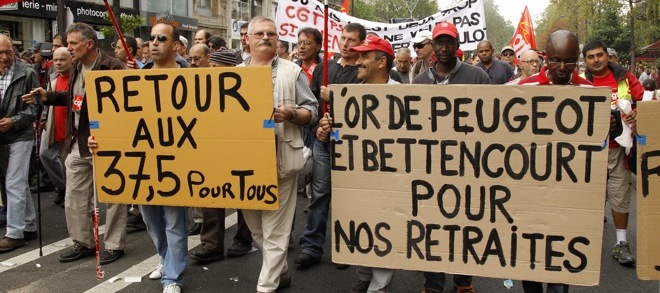Europe’s own carmageddon
The auto industry is in full-blown crisis yet again, but this time it’s not Detroit
Private and public sector workers attend a demonstration over pension reforms in Paris September 7, 2010. France faces serious rail and air traffic disruption due to strike action as labour unions seek to mobilise millions of protesters against plans to raise retirement age. The strikes, mostly scheduled to last 24 hours and organised to coincide with presentation of a pension reform bill to parliament today, are expected to hit public transport and schools badly. The placard reads “The gold of Peugeot and Bettencourt (France’s richest woman, heiress to the L’Oreal empire) for our pensions”. REUTERS/Benoit Tessier (FRANCE – Tags: POLITICS CIVIL UNREST EMPLOYMENT BUSINESS)
Share

Auto sales are plummeting to levels not seen since 1990, analysts are talking of an industry in need of divine intervention and factories risk closure. Sounds like Detroit in 2008. But this is the picture of Europe’s auto industry today as it heads into its sixth year of falling sales.
The Paris Motor Show is normally a showcase of manufacturing pride and consumer excitement. This year, observes IHS Global Insight auto analyst Carlos da Silva, “I don’t want to say [it was ] ‘lame,’ but it was on the sad side. Confidence levels are so low here in Europe that we need a miracle; we need the Pope to do something.”
Europe’s auto market is projected to shrink 8.8 per cent this year. The European Automobile Manufacturers’ Association said not since its reports began in 1990 have new-car registration numbers been so low; they were down 8.9 per cent last month—at roughly 700,000 cars across the EU—compared to the same period last year.
Carmakers are struggling to keep factories running; poor demand has many functioning below the capacity needed to cover costs. Consumers in Greece, Italy and Spain continue to put off big-ticket purchases, just as Americans did in 2008 and 2009. Ford suffered a 29 per cent decline in sales compared to a year ago, while Fiat, Renault, BMW and Peugeot Citroën weren’t far behind. According to Da Silva, the already dire conditions in Europe are projected to get worse. Even Germany, the eurozone’s one economic stalwart, is facing a shrinking auto market.
Peugeot Citroën said earlier this year that it is closing a factory in France and cutting 8,000 jobs. “We’re really in the eye of the hurricane,” CEO Philippe Varin told the Associated Press. Bigger international automakers, meanwhile, are hoping to weather the storm with profits in other markets offsetting Europe’s losses.
In the U.S., the 2008 downturn drove Chrysler and General Motors into bankruptcy protection, rescued only by government bailouts. Hopes remain high that the EU has a plan to revive the sinking economy and prevent a similar fate for European automakers. But nobody expects a rosy outcome. As Da Silva concedes, “we will be in this situation for quite some time.”